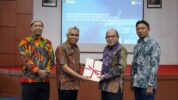Indonesia and Germany Seal 75 Million Euro Debt-to-Health Swap for Healthcare Improvements
JAKARTA, RAKYAT NEWS – Indonesia and Germany reached a significant agreement to convert debt into a health-focused initiative, valued at 75 million euros.
The funds will be used to address critical health challenges such as tuberculosis (TBC), HIV, hepatitis, and the strengthening of the overall healthcare system in Indonesia.
The formal signing of this debt-to-health swap agreement took place at the Ministry of Finance’s Headquarters in Jakarta. The agreement is seen as a crucial step in solidifying both nations’ commitment to enhancing national healthcare and supporting global health efforts.
Suminto, Director General of Financing and Risk Management at Indonesia’s Ministry of Finance, emphasized that the signing of this agreement marks an important milestone. It highlights the ongoing partnership between Indonesia and Germany to address health issues in the region and improve healthcare infrastructure.
The agreement follows up on a principle agreement reached in April 2024, which was then formalized through the December signing. With this arrangement, Indonesia’s debt will be converted into a direct investment aimed at improving public health programs, including combating HIV, TBC, and hepatitis.
This debt swap is part of the Global Fund’s Debt-to-Health (D2H) initiative, under which Germany has been a partner since 2007. The program aims to mobilize additional resources for countries that benefit from Global Fund grants, including Indonesia. The initiative is seen as an innovative financial mechanism to tackle global health challenges.
Suminto praised the agreement as a brilliant example of how nations can cooperate using innovative financial instruments to address pressing health issues. He highlighted that this initiative is not only a financial solution but also a testament to international collaboration in tackling health crises.
Ina Lepel, the German Ambassador to Indonesia, underscored that the debt conversion is a meaningful step in the long-standing cooperative relationship between the two countries. The agreement will contribute to Indonesia’s broader public health objectives, enabling better access to healthcare and supporting the country’s healthcare infrastructure.
This debt-to-health swap is also aligned with Indonesia’s commitment to achieving the Sustainable Development Goals (SDGs), particularly those related to health. The initiative aims to end the spread of AIDS, TBC, and malaria by 2030, as well as combat hepatitis and other infectious diseases, marking a significant step toward improving health outcomes for Indonesia’s population. (Uki Ruknuddin)



























Tinggalkan Balasan